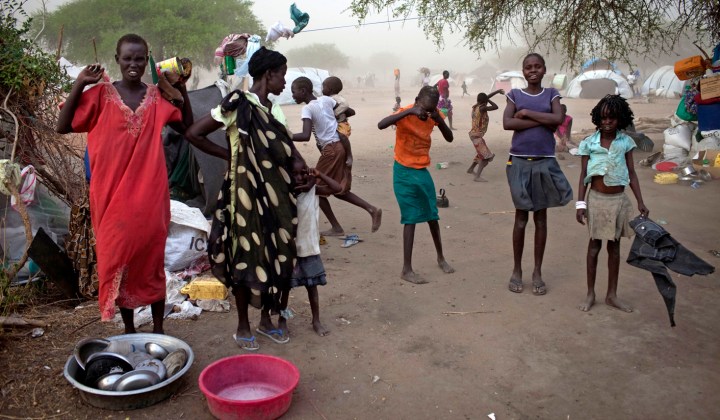Africa
South Sudan: Whose ceasefire is it anyway?

Last week, to much fanfare, South Sudan’s warring leaders agreed to put down their weapons. But the peace hasn’t lasted long. Just hours later, soldiers and rebels were at each other again, trading attacks in the oil-rich Upper Nile state, and they haven’t stopped. So much for that ceasefire. If anything, its failure proves just how difficult it will be to defuse the violence – and, even more disturbingly, that no one really has the authority to do so. By SIMON ALLISON.
There hasn’t been much good news emerging from South Sudan this year. Quite the opposite, in fact, as the new country turns in on itself. A power struggle within the ruling party has exploded into a vicious civil war, characterised by ethnic violence. Millions have been forced from their homes and land, and there is a very real danger of famine in this fertile land. To avert a humanitarian catastrophe, the fighting needs to stop. Soon. Ideally farmers need to get back to their lands before the seasonal rains start in earnest, to plant their crops for the next harvest, or else South Sudan will go hungry.
Last week, there was a glimmer of hope. In Addis Ababa, while studiously avoiding a face-to-face meeting, President Salva Kiir and former Deputy President-turned-rebel-leader Riek Machar managed to agree to a ceasefire. “Now we have come to our senses…dialogue is the only answer to whatever problem we had. We will continue to move in the right direction,” said Kiir on Friday, as he signed the document which was supposed to come into effect on Saturday.
Saturday came and went. The fighting continued. Sunday came, and Monday, and Tuesday, and still the warring fighters traded bullets and attacks. The government said that 27 soldiers were killed in oil fields around the northern city of Bentiu. The rebels said they had been targeted, by both ground attack and artillery, in at least two provinces.
So far, it hasn’t been much of a ceasefire. The encouraging reconciliation talk has been replaced by yet more recriminations, with both sides accusing each other of being the first to break the agreement.
But whose agreement was it really? Even assuming, for the moment – and it’s a very big assumption – that the deal between Kiir and Machar was negotiated in good faith, it is far from clear that either leader has the authority to make the fighting stop.
One element to this is simple logistics. South Sudan is a vast, technologically barren country. The armed forces have radios, but they don’t always work. The various militia groups involved might have cellphones, but cellphone towers are few and far between and really cater only for urban areas. This is a particular problem for the rebels, who have had very limited time in which to set up proper communication networks.
“Individual fighting units will likely be making critical decisions on the basis of woefully inadequate information,” noted Eric Reeves, an activist-academic specialising in the Sudans, on Sudan Tribune. “An accidental shot might turn into a full-scale battle. Rumors will spread like wildfire if there is no authoritative communication-and-command system in place to control actions by opposition forces.”
Reeves also notes that even if Riek Machar was able to give orders, there is no guarantee that those orders would be followed by the ragtag bunch of militiamen he has assembled under his banner. Machar calls his fighters the White Army, but this is a misnomer; they are not a single, cohesive force, but rather a collection of well-armed opportunists.
“[Machar] is not the leader of the political opposition, and indeed is the only major figure pushing for military rebellion” writes Reeves. “…nor is Riek a true leader of the forces in the field, increasingly divided along ethnic lines and divided by a vast geography with almost no communications or transport infrastructure…his control of the White Army (Nuer youth militia) is highly doubtful.”
President Kiir, despite enjoying the trappings of state, has a similar problem. He’s been mobilising a few militias of his own, particularly among the Dinka youth (The Dinka and the Nuer are South Sudan’s two largest tribes; Kiir is Dinka while Machar is Nuer. Tensions between the two ethnic groups have been high ever since the fighting started in November).
As noted in Africa Confidential, these untrained youth, hard to control at the best of times, have an extra motivation to fight against Machar, particularly in the trouble spots around Bor. “They are the descendants, and in some cases the survivors, of the Bor Massacre of 1991, when Riek’s forces killed over 2,000 Bor Dinka during his first split from the SPLM/A [the Sudan People’s Liberation Movement/Army, now the ruling party and state army].”
It is little wonder, in this context, that neither side in South Sudan’s new civil war has been able to enforce the ceasefire signed in Addis Ababa. Both leaders have deliberately exploited insecurities and historical enmity to further their short term political aims, with little regard for consequences. And despite their protestations to the contrary, neither will be surprised at their inability to reign in the violence. With decades of fighting behind them, both know that it’s far easier to unleash the dogs of war than it is to restrain them. DM
Read more:
- South Sudan: what happens when the rains come down? on Daily Maverick
Photo: A photograph made available on 09 March 2014 shows South Sudanese people standing up during a dust storm in the biggest IDP camp for Dinka ethnic group placed in Minkamman, South Sudan, 04 March 2014. A power struggle between South Sudanese President Salva Kiir and his former vice-president Riek Machar turned violent in mid-December, when clashes erupted between their ethnic groups, the Dinka and the Nuer. EPA/JM LOPEZ



















 Become an Insider
Become an Insider